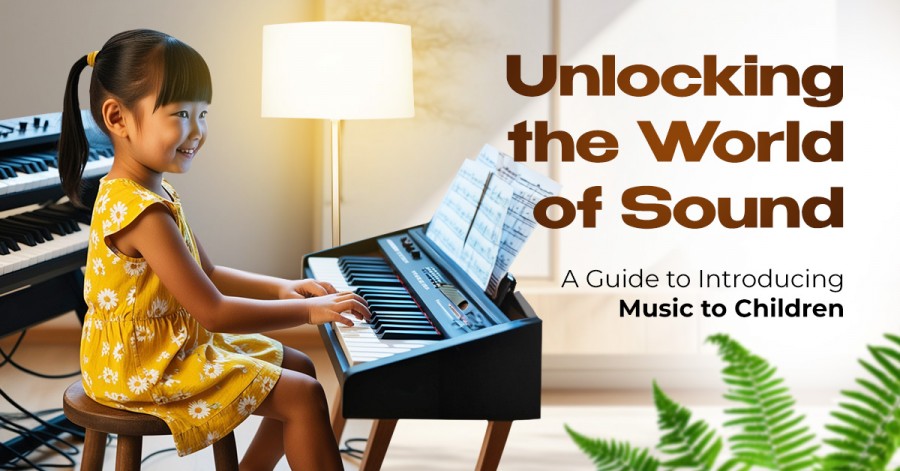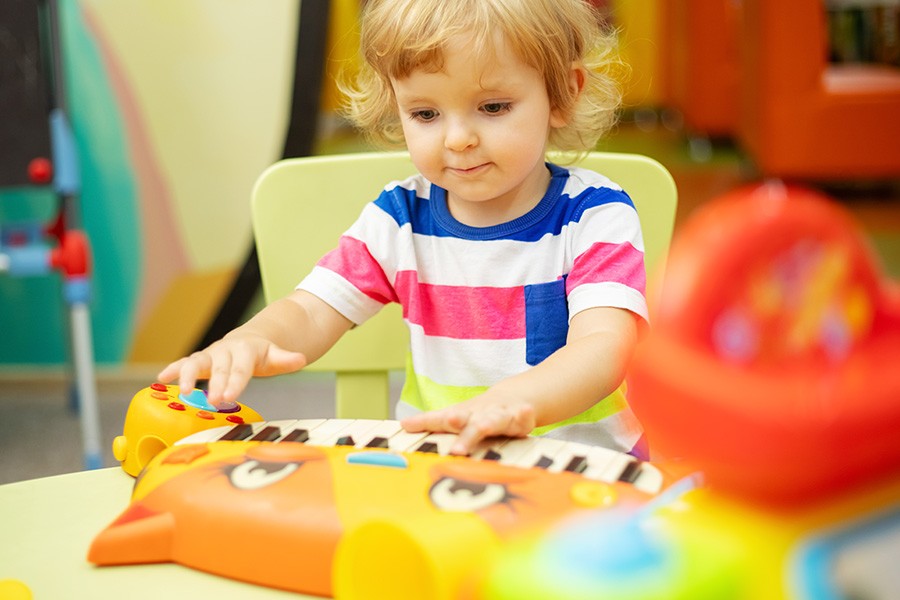How to Introduce Music to Kids: A Guide to Unlocking Their Potential
Published 11 September 2024 at 10:58
Tickikids Blog Singapore > Parenting > How to Introduce Music to Kids: A Guide to Unlocking Their Potential

Scientists have discovered that classical music positively influences plant growth, promoting faster development and increasing foliage. If harmonious sounds can have such an effect on plants, imagine the impact on humans! Even before birth, babies can recognise the voices of their parents, responding to different tones, volumes, and types of sounds. Pregnant women are often encouraged to speak, sing, or read aloud to their babies, as these early auditory experiences create a comforting environment. Once born, babies often find comfort in their mother’s lullabies and familiar sounds.
Experts in child development emphasise that music education should play a key role in a child’s overall development. Learning to play musical instruments boosts fine motor skills and stimulates both sides of the brain, while vocal training enhances breathing techniques and improves speech. Music lessons help expand a child’s horizons, enhance memory, and improve cognitive skills. Children who engage with music from an early age often display perseverance and determination, traits that help them excel academically.
Recent psychological research shows that music lessons or even just listening to music strengthens neural connections in the brain. Early music education has been linked to better coordination, which in turn improves emotional intelligence. This means that children who are exposed to music early on tend to handle frustration better, have more emotional control, and are less likely to develop attention disorders. Essentially, engaging with music “rewires” the brain, reinforcing or creating new neural pathways that benefit cognitive and emotional development.

Image Credit: Depositphotos
Begin Before Seven
Although learning music at any age is beneficial, the greatest impact is seen when children begin before age seven. Early exposure helps identify a child’s musical ear and vocal potential, setting the stage for future artistic growth. A child raised with quality music often stands out from their peers, showing creativity, a refined taste, and a rich perception of the world. Since young children tend to be active and have short attention spans, starting with musical toys or simple instruments like tambourines, mini xylophones, and maracas is ideal. These toys help children understand cause and effect, which is an important step in learning how to play instruments. Technology can also be a helpful tool in early music education. Music apps, online resources, and interactive platforms can supplement lessons with virtual keyboards, sing-alongs, and games that make learning fun and accessible.
By age five, many children are ready to try playing simple melodies, and parents can then consider hiring a music teacher to nurture their budding talent. It’s important to follow the child’s lead and respect their interests, as true progress happens when they are genuinely motivated to learn. For beginners, it’s essential to choose instruments that match their skill level. Instruments like the piano, guitar, violin, flute, and drums offer a strong foundation in music theory and come in different sizes to suit young learners. Additionally, starting with more accessible instruments like the ukulele or xylophone can help build confidence. Ultimately, selecting instruments based on the child’s interests will foster a deeper connection with music and enhance their enjoyment and commitment to learning.

Image Credit: Depositphotos
Sing through Daily Routines
Music offers a unique way to deepen your bond with children. Teaching music isn’t just about passing on knowledge; it’s about sparking a lifelong passion for melody, rhythm, and harmony. Throughout history, songs have been used to educate, comfort, and connect with children long before writing existed. Singing simple, familiar tunes with young kids is a joyful and meaningful way to introduce them to music while also nurturing their creativity, rhythm, language development, and social skills.
A parent’s voice is one of the first and most reassuring sounds a child hears. Whether through soothing lullabies or upbeat songs, your voice creates a sense of love and security. Holding your child while swaying to a gentle song or tapping your foot to a lively beat helps them connect with music while also building your relationship. It’s a fun way to incorporate rhythm into their daily lives, and dancing together keeps you both active while creating moments of joy and connection.
- Wake-Up Songs: Start the morning with a cheerful song. A simple "Good Morning" tune or a fun, upbeat melody can make waking up more pleasant and energising.
- Meal Time Melodies: Sing or hum while preparing meals or setting the table. This can become a fun ritual that children look forward to, and songs about food can be both entertaining and educational.
- Clean-Up Songs: Create or use songs that encourage tidying up. Tunes like "Clean Up, Clean Up, Everybody Everywhere" make organising fun and engaging for young children.
- Bedtime Lullabies: End the day on a soothing note by singing soft lullabies. This calming routine can help children feel more relaxed and ready for sleep.
You can also explore nature’s music! Take your child outside and encourage them to listen to the sounds of nature. Point out the rustling of leaves, birds chirping, or the wind blowing. Ask them to mimic these sounds or create a story around what they hear. Rain can be a wonderful opportunity to explore rhythm. Tap along to the rhythm of raindrops on windows or use it as inspiration to create your own rhythm with household objects.
Encouraging everyday musical moments with your child can turn ordinary activities into joyful learning experiences. Music can easily be woven into daily routines, helping to nurture creativity, improve coordination, and strengthen the bond between you and your child.
What to Expect in a Music Class
Most music classes for young children are highly interactive, combining singing, dancing, and playing simple instruments like shakers, tambourines, or drums. These activities help children connect with music in a hands-on way. Many classes encourage or require parents to participate alongside their children. This shared experience deepens the parent-child bond and creates a sense of security for the child as they explore new activities. Classes are typically structured by age groups, ensuring that activities are suited to the child’s developmental stage. Infants might focus on sensory experiences through soft sounds and rhythms, while toddlers engage in more active participation with singing, movement, and instrument play.
Repeating songs and routines helps children feel comfortable and understand the patterns in music. Familiar songs are often revisited to reinforce learning and build confidence. While the focus is on play and enjoyment, music classes subtly introduce concepts like rhythm, melody, and pitch.
Create an exciting and nurturing learning space for your beginner music student! Ensure the class environment is welcoming and encourages children to express themselves freely, where mistakes are seen as part of the learning journey. When selecting a music teacher, choose someone who promotes open communication and values creativity. For young learners, it's important to include fun elements like educational games, musical puzzles, and hands-on activities to keep them engaged and make the learning experience enjoyable and interactive.

Image Credit: Freepik
Encourage Freedom and Exploration
Introducing children to music with a guided yet flexible approach allows them to explore and develop their musical interests at their own pace while benefiting from structured guidance. This balanced method fosters creativity, keeps children engaged, and encourages them to enjoy music without feeling pressured.
Lead by example. Sing with your child or show them how to use an instrument, but let them imitate and experiment in their own time. Gently introduce more complex musical activities as they grow, such as tapping out rhythms or singing harmonies. Encourage them to explore different genres of music and instruments, providing a variety of experiences that suit their developmental stage.
Allow children to engage with music in a way that feels natural to them. If they prefer banging on a drum rather than following a tune, that’s okay! The key is letting them interact with music in a way that sparks their interest. If your child gravitates toward a particular instrument, song, or genre, encourage it. Letting them lead the way helps build their connection to music, keeping their enthusiasm alive.
If your child masters a simple rhythm or learns the words to a song, celebrate that accomplishment. This boosts their confidence and keeps them motivated to continue exploring music! As your child grows, their musical preferences and abilities will change. Stay flexible in your approach, adapting to their evolving interests and skill levels. If they suddenly show interest in a new instrument or genre, be ready to explore that with them.
Take Children to Musical Events
Visiting musical events is a wonderful way to introduce kids to the vibrant world of music. It not only creates memorable experiences but also exposes them to a wide variety of sounds, instruments, and musical styles that they might not encounter at home. Attending live music events—whether it’s a concert, a musical theatre production, or a cultural festival—introduces children to various music styles, from classical and jazz to folk and pop. This helps them develop an appreciation for different genres and instruments, expanding their musical palate.
Seeing instruments being played live is much more impactful than listening to recordings. Children can see how sounds are created, from the strumming of a guitar to the beating of a drum, making the connection between movement and music. Live music events highlight the communal aspect of music. Whether it’s a small group gathered for a local concert or a large audience at a festival, children see how music brings people together, creating a sense of belonging and shared enjoyment.
Introducing music to your children is a rewarding adventure that offers a multitude of benefits for their cognitive, emotional, and social improvement. By creating musical surroundings at home, undertaking fun and educational activities, exploring unique instruments, and incorporating music into day by day exercises, you may nurture a lifelong love for music in your kids. Consider exploring basic music classes or online training to further enhance their musical skills and reports. Embrace the pleasure of music collectively as a family and watch your kids thrive and grow into enthusiasts.